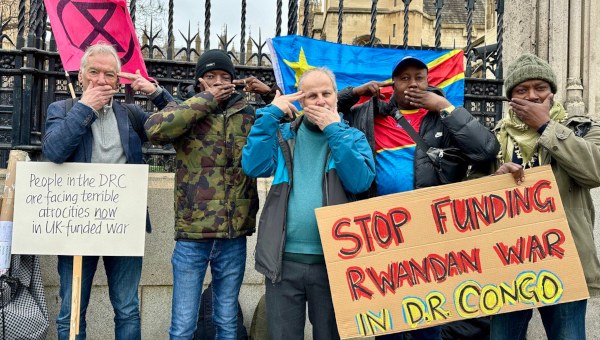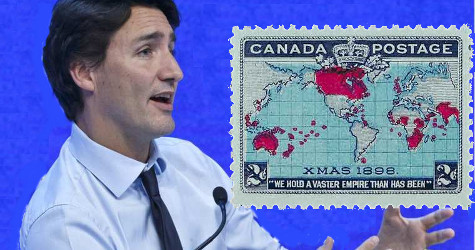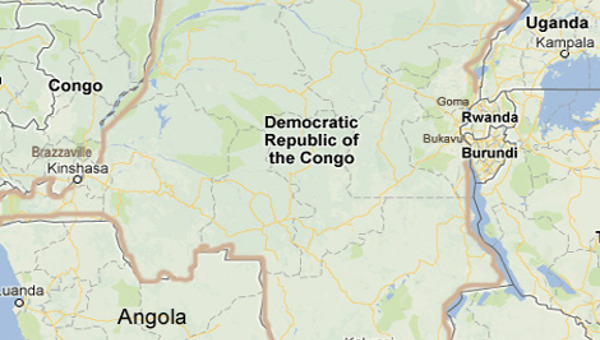Defusing The Next Carbon Bomb: The Fight to Stop Big Oil In Congo
The Democratic Republic of Congo (DRC) is at a critical turning point: while violent conflicts persist in the east of the country, the relaunch of oil and gas block auctions risks worsening instability, steamrolling human rights, and jeopardizing the country’s environmental commitments – turning the world’s largest terrestrial carbon sink into a massive carbon bomb.
In response to this threat, the Notre Terre Sans Pétrole (Our Land Without Oil) coalition is calling for an immediate halt to the process of putting the 52 oil blocks up for sale, the cancellation of the three oil and gas blocks already awarded, and a complete moratorium on oil and gas exploration and production in the DRC.
They call on international partners, donors, multilateral agencies and companies not to support, finance, or participate in these destructive projects, which betray the aspirations of the Congolese people for a future of peace, justice, and dignity. International allies worldwide are urged to join an International Week of Action from June 22 to 28 against oil expansion in the DRC and for climate justice by organizing marches, sit-ins, performances, open letters, online campaigns, and more.
ZNet’s Alexandria Shaner and François Kamate, a young climate and human rights defender from North Kivu province, discuss the situation in-depth and share a call to action for the international community.
This interview was conducted in French, then translated and edited for length and clarity, first published on ZNetwork website.
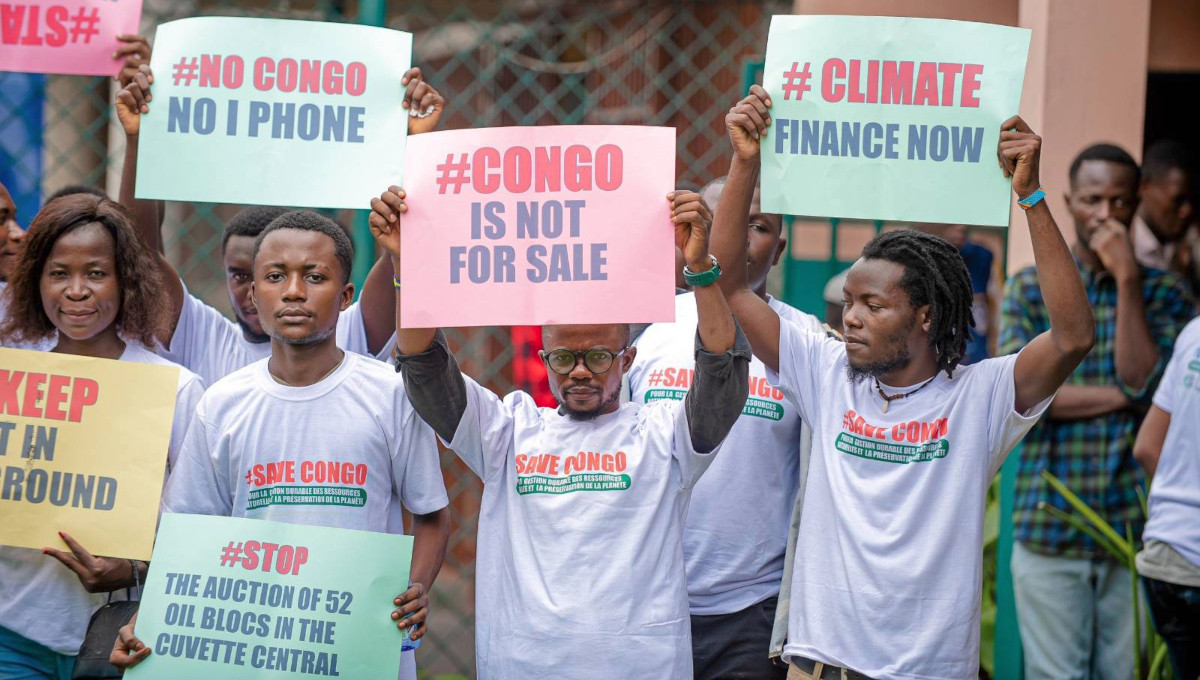
Alexandria Shaner (AS): On May 3rd, the government of the DRC announced it will open the sale of 52 new oil blocks, in addition to the three already assigned to a state-owned company. What are the implications of this announcement in terms of ecology, human rights, and government transparency?
François Kamate (FK): This is a decision with serious ecological and legal consequences. It will result in the direct destruction of the Kivu-Kinshasa Green Corridor, a project that is crucial to the preservation of our biodiversity and the national ecological balance.
The decision also runs counter to the DRC’s international commitments in terms of environmental protection, particularly in the context of safeguarding the Congo Basin. The Cuvette Centrale (central basin) is home to wetlands vital for the global climate, including vast peatlands and tropical forests, recognised as one of the largest carbon sinks in the world. It does not need oil wells, but protection and restoration.
In addition, this decision constitutes a clear violation of human rights, in particular the right to a healthy and equitable environment. Even today, we are being told by our government about their “expertise and respect for protected areas”, but where is the transparency? Which local community was consulted? The project has been relaunched in opacity, following the cancellation of a previous tender tainted with several irregularities.
Our struggle is being waged on several fronts, and it is imperative to make them transparent and to connect them, both for local communities and for the international community:
As mentioned, after the previous failed attempt to auction 27 oil blocks, the Congolese government launched a new map of 52 oil blocks, many of which are located in the Cuvette Centrale. This vital carbon reservoir is crucial for the global climate; exploiting it would release billions of tons of CO₂ and endanger ecosystems and Indigenous communities.
Additionally, in the Albertine Graben, a highly biodiverse region, oil blocks are being targeted for integration into the EACOP (East African Crude Oil Pipeline) megaproject. A petroleum resource-sharing agreement has already been signed between the DRC and Uganda, increasing the risk of unregulated cross-border exploitation.
Three gas blocks are also part of this fossil-fuel offensive. The Congolese government is currently seeking to allocate them to controversial companies involved in financial, environmental, and corruption scandals, as documented in past investigations. This lack of transparency is deeply concerning and incompatible with responsible governance.
Meanwhile, the Anglo-French oil and gas company PERENCO, already active in Moanda (DRC), continues to extract oil under disastrous human and environmental conditions – without the free, prior, and informed consent of local communities. More recently, the Congolese government signed a new agreement with Trafigura Group, a multinational company already accused of large-scale pollution and human rights violations in several Global South countries.
AS: How do you see the links between the ongoing violence in the DRC and extractivism – whether of fossil fuels, minerals, or labour?
FK: The current violence in the DRC is closely linked to extractivism. You could even say that extractivism is the driving force behind the decades-long armed conflict. Multinational corporations, with the complicity of neighboring countries, support armed groups in their bid to control Congolese natural resources. Furthermore, several bilateral agreements between the Congolese state and foreign powers, such as the sovereignty agreement with Belgium, hardly benefit the Congolese people. Instead, these agreements facilitate the takeover of our natural wealth by countries like Belgium and the United States, to the detriment of our development.
Our position on this dynamic remains steadfast – we say NO to this policy of masked destruction dressed as “development.” We reiterate our position against this project that threatens biodiversity, vital ecosystems, the rights of local communities, and the planet’s climate future.
The cancellation of the DRC’s 2022 oil tender in late 2024 sent a clear message: the oil sector here is neither viable nor credible. With no serious bidders and widespread irregularities – from total opacity to ignored environmental and social assessments – the process collapsed under the weight of its own failures. This outcome reflects a broader truth: the Congolese oil sector cannot deliver sustainable development. It lacks transparency, accountability, and legitimacy in the eyes of the global energy industry.
Moanda, where oil has been extracted for nearly 50 years, is a stark example. Rather than improving lives, oil exploitation has deepened poverty, destroyed ecosystems, and fueled injustice. The harm there has triggered legal challenges and left a legacy of pollution, division, and disempowerment. Ignoring these realities, oil companies risk repeating – and amplifying – those harms, facing severe legal, financial, and reputational consequences in the process.
The promise of oil as a development engine is an illusion. Revenues benefit a small elite while most Congolese face worsening poverty and hunger. In a country where corruption in the extractive sector is systemic, any new oil project will only entrench inequality and instability. This is especially dangerous in a region already experiencing climate stress, displacement, and conflict. Far from bringing peace or prosperity, oil fuels unrest and repression.
We call on oil companies and our government to withdraw from this harmful trajectory. True development lies not in deepening extractive dependency but in supporting community-led solutions, clean energy alternatives, and a just transition that protects people, nature, and the future.
AS: How is the resistance organizing itself against this new fossil fuel project? Could you talk about Notre Terre Sans Petrole, local groups, and international solidarity?
FK: A well-coordinated, citizens’ fightback is already underway to stop this dangerous project. Notre Terre Sans Pétrole (Our Land Without Oil) is a citizen-led campaign that firmly opposes the expansion of oil and gas projects in the DRC. We have brought together Congolese environmental groups and other civil society groups, as well as local and international social movements – we are now a growing coalition of more than 176 Congolese, African, and international organizations. We call for the definitive abandonment of all future hydrocarbon exploitation projects in the DRC and are also proposing sustainable alternatives to fossil-fuel projects.
For example, part of our coalition are the Extinction Rebellion groups in the DRC, who have released demands and a call to collective action, to raise our voices to say no to fossil energies and yes to a free and green DRC:
- The immediate cancellation of the sale of these oil blocks
- An independent and public audit of the process
- Respect for the rights of and inclusion of local communities
- A real transition to renewable energies
We are also building on the successful cancellation of the previous oil and gas tender in 2024. Over a multi-year campaign, activists and affected community members in the DRC, alongside international allies, campaigned tirelessly to defeat the previous sale of these oil blocks. Several campaigns were run to oppose the auctioning of oil blocks, including Pétrole Non Merci, Save Virunga, and others. During the implementation of these campaigns, we faced many challenges: insecurity and repression, arbitrary arrests, impassable roads to affected areas, and lack of resources to cover all target areas. Now, we must again sound the alarm and mobilize.
Despite these obstacles, important lessons were learned that empower us for the struggle ahead – the power of nonviolent action as a means of exerting pressure, the importance of frequent field actions, and the need for continuous mobilization to force the authorities to respect their commitments.
AS: In Uganda, 11 nonviolent protesters were recently arrested and illegally detained while trying to hand over a letter to KCB Bank Uganda asking them to stop funding the highly controversial East African Crude Oil Pipeline (EACOP) project, a pipeline criticized for its devastating consequences including destruction of natural habitats and displacement of more than 10,000 families. Eco-defenders in the DRC have come out in support of the Stop EACOP activists – how do you understand the connection between this repression in Uganda and the ongoing struggle of eco and human rights activists in the DRC?
FK: What is happening in Uganda against the eco-defenders is similar to our situation in the DRC. We stand in solidarity to demand that the Ugandan activists must be released immediately, and the EACOP project, with its disastrous consequences for local populations, must be halted. It is unacceptable for critical voices to be repressed. Activists deserve respect and dignity for their selfless struggle in the service of humanity and the planet.
Notre Terre Sans Pétrole was actually inspired by the success of the StopEACOP campaign in Uganda. We share a call for the definitive abandonment of all future hydrocarbon exploitation projects in our countries and the vision to promote energy alternatives that respect the environment and the rights of local communities. Stop EACOP’s initiative and bravery under extreme repression has raised awareness and strengthened the global fight against hydrocarbons.
Our struggles are inextricably linked beyond borders because extractivism, and the repression required to carry it out, is an international project. A recent enactment of a law by President Tshisekedi ratifying a long-hidden 1990 agreement with Uganda is deeply alarming. This law paves the way for oil exploitation in some of the most sensitive ecological zones in the DRC, including areas near Lakes Albert and Edward and the UNESCO-listed Virunga National Park. The Notre Terre Sans Pétrole campaign strongly condemns this decision, which directly contradicts the president’s own rhetoric of the DRC as a “solution country” to the climate crisis.
Instead of protecting biodiversity and local communities, this law doubles down on fossil-fuel extraction, threatens critical ecosystems, and risks deepening tensions with Uganda. It also reinforces the destructive EACOP project, already widely condemned for displacing communities and endangering Lake Victoria. Past cross-border oil deals, like the one with Angola, have shown these agreements to be both environmentally devastating and economically ineffective, costing the DRC tens of billions.
We urgently call for a permanent renunciation of oil and gas exploitation in these regions. The future lies not in fossil fuels but in clean energy, sustainable development that puts people over profit, and conservation that genuinely benefits local communities and protects our shared natural heritage.
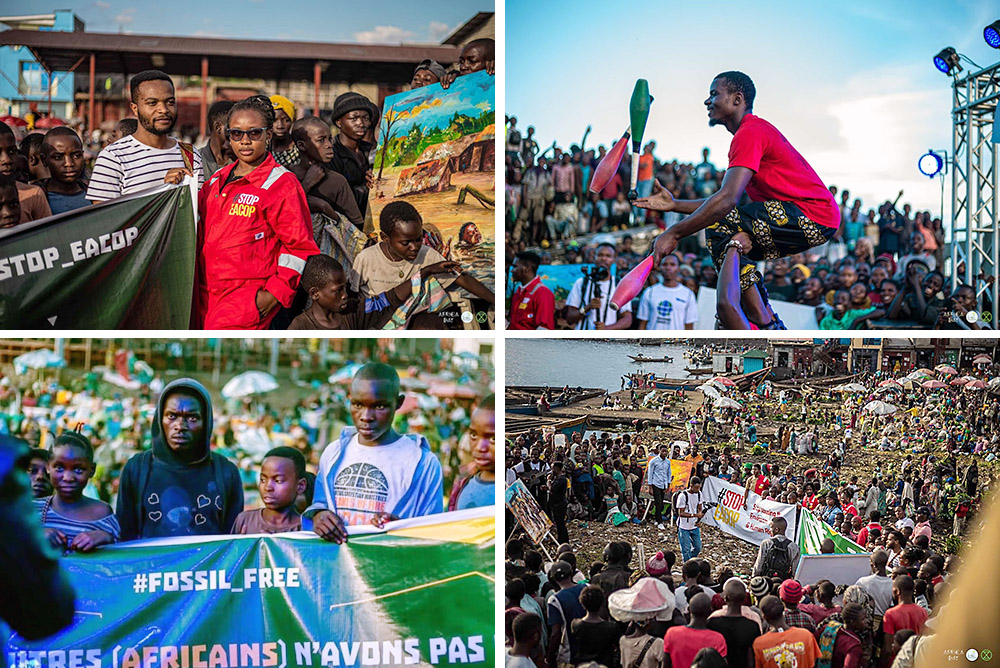
AS: Are there upcoming campaigns or actions that you’d like to amplify? And how can people around the world accompany the people of the DRC in this struggle?
FK: We have set up a task force to fight this new oil project. The first field actions will begin in June, where we will denounce this ill-considered and damaging government decision and demand that Multinational corporations like PERENCO, Trafigura, and TotalEnergies/EACOP be held to account for the damage already caused to communities. As they continue to destroy ecosystems, violate human rights, and endanger lives, we must stop their ongoing exploitation of the DRC, which has enjoyed the complicity of government.
We make an urgent appeal to the international community: turn your gaze to what is happening in the DRC, and act to save the Congo and its people. Save the entire planet from the release of a massive carbon bomb whose harms will not respect borders.
There will be an International Week of Action from June 22 to 28 against oil expansion in the DRC and for climate justice. We ask international allies to organize marches, sit-ins, performances, open letters, online campaigns, and more. •


